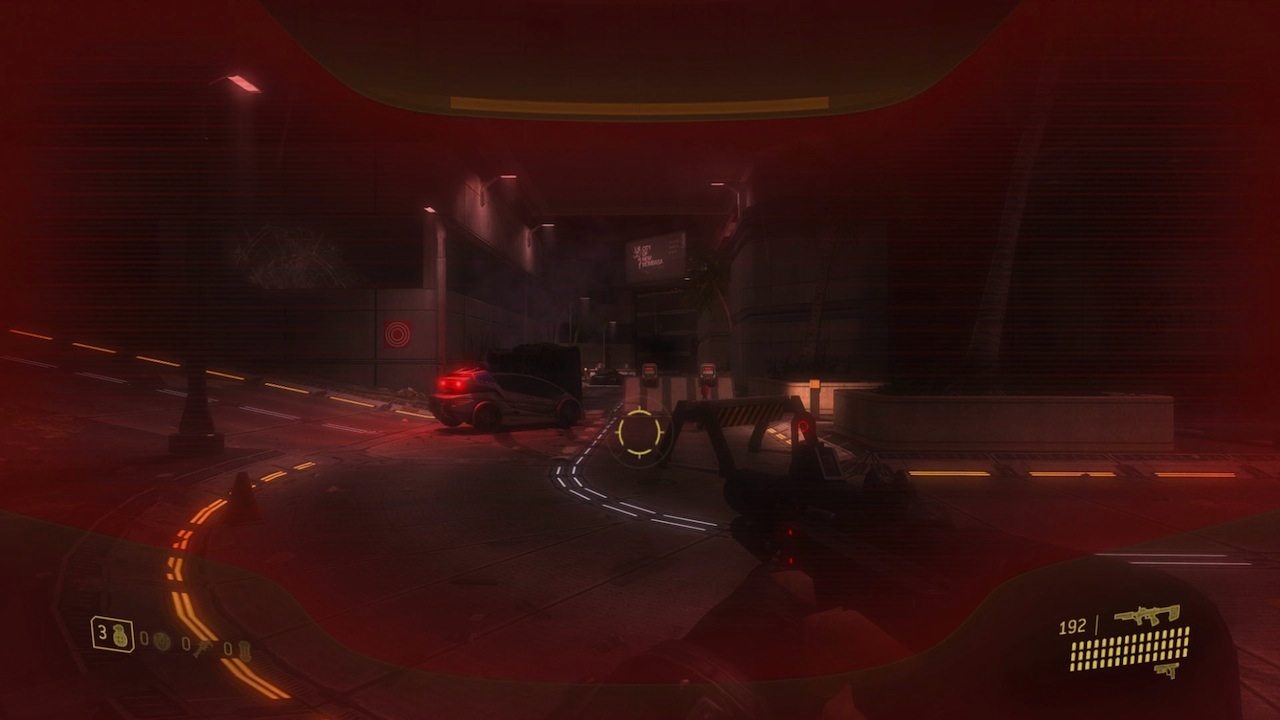GR Showdown pits the Game Revolution staff against each other in a passionate debate on a particular hot-button gaming topic. Our self-imposed rules? There is no middle ground—all must take a side. All debates will have an equal number of representative on both sides: either 1-on-1 or 2-on-2 . And all our arguments must be made in 350 words or fewer (500 or fewer, if it's one-on-one). Which side are YOU on?

 Nick Tan – YES: Accessibility generally comes at the cost of poorer game design, and nothing says this more than red-out regenerating health. Ah, yes, the lesser cousin of quick-saving. Where do I even start?
Nick Tan – YES: Accessibility generally comes at the cost of poorer game design, and nothing says this more than red-out regenerating health. Ah, yes, the lesser cousin of quick-saving. Where do I even start?
For first-person shooters that attempt to be "realistic", even in a graphical sense, red-out regenerating health doesn't make conceptual sense. It's understandable if the main character is a cyborg, has a power suit, or is Wolverine, but for humans in Call of Duty, it blatantly conflicts. People have just ignored it so long that they've become comfortable with the inconsistency. They "just don't care" because it's convenient. It's junk gaming.
Health systems will never be fully realistic, let's set that straight. Walking over a box with a plus sign will not save you. But regenerating health makes gameplay boring. It's an issue of tension, or lack thereof.
Old-school FPS veterans remember the times they survived an entire level with but a sliver of health—not much in gaming is as thrilling as that. But regenerating health, even shields, takes all of that away. It effectively reduces all level design to ducking behind conveniently placed cover and chasing checkpoints—inching toward the next spawn point on the skilllful basis of dumb luck.
Though regenerating health makes single-player campaigns easier, hardly anyone would compare them to those of better shooters that are well-paced, lengthy, and mechanically interesting. What happened to long-term risk and reward? Are we so impatient that we need our games to be too?
Limited regenerating health/shields may be a workable compromise, but full regenerating health is essentially hand-holding. It allows players to be sloppy whenever a low grunt comes around because it can't penetrate your shields anyway. They make campaigns forgettable and utterly disposable, a fact which certain publishers love because it lowers the standard for making a copy and paste job every damn year—all in the name for a buck, a quick fix, and screens with fuzzy borders.
(Note: I don't care if you find holes in my arguments. I'll just hide in a corner and in five seconds I'll be just fine.)
 Anthony Severino – NO: As a game reviewer, I absolutely love regenerating health. With deadlines looming and a distinct lack of time, regenerating health has saved my ass in more ways than one. Maybe I missed an important health pick-up, or my inventory is low and I have a hunch a boss encounter or epic battle is approaching—I don’t want to have to replay an area again and again just to move on. I'd rather duck into cover, wait a bit, and jump right back in, guns-a-blazing.
Anthony Severino – NO: As a game reviewer, I absolutely love regenerating health. With deadlines looming and a distinct lack of time, regenerating health has saved my ass in more ways than one. Maybe I missed an important health pick-up, or my inventory is low and I have a hunch a boss encounter or epic battle is approaching—I don’t want to have to replay an area again and again just to move on. I'd rather duck into cover, wait a bit, and jump right back in, guns-a-blazing.
Even aside from reviews, I just don’t have time like I used to and when I die repeatedly in games, I get frustrated. I want to keep moving right along and enjoy the experience. Regenerating health ensures that I can do that. I do welcome a good challenge, but I think if a game is designed well, it can be challenging without being frustrating and forcing me to replay the same battle 30 times. It doesn’t just kill my character—it kills my enjoyment.
Do I think that it make a game easier than if it didn’t have regenerating health and you had to rely on inventory or random health pickups found around the map? To a point, yes. But I also think it makes the game more accessible for newcomers or casuals. And let’s face it, the most popular genre out there today is the first-person shooter genre. The last thing developers want to do is alienate the people picking up their game or franchise for the first time. They know if they make it accessible and someone enjoys the game, they’re likely hooked and will buy the next annual rehash, and the next, and the next…
Oh, and I don't necessarily love the red-out—I much prefer grayscale, as I feel that might be a more realistic sensation of life slipping away from you. But like Nick said, there's no true realism when dealing with health in video games.
It works for me, and frankly, that’s how I form my opinion. Maybe I'm just old and cranky and don't have the time to spare. I can, however, see why Nick, Alex, and others are against it. Daniel, back me up here.


Alex Osborn – YES: Oddly enough, I don't disagree with you all that much, Anthony. There are, however, two small distinctions that put me on the other side of the fence; the first of which is the "red-out" aspect.
Like you, I all-too-often get frustrated when trying to make my way through a review, only to get hung up on a particular section because I keep dying. Believe it or not, regenerating health isn't always enough to help me through these particular circumstances, as often times a heavy firefight will leave my vision obscured to the point of infuriating ridiculousness. If I'm struggling through a section and am practically dead, why make it harder by reducing my vision? Are the developers trying to get me to rage quit?
If anything, wouldn't it make more sense to give the player some sort of adrenaline boost or sense of heightened awareness? After all, wouldn't someone with their back against the wall, who's fighting for their life, be all the more desperate and thus more threatening? Plus, does obscuring the player's vision make the experience any more fun? If not, it shouldn't be in the game.
Then there's the distinction between recharging shields and recharging health. While the image above perfectly illustrates my issue with the red-out filters in Halo 3: ODST, I do appreciate the series' approach to health. In a game like Uncharted, regenerating health is absolutely asinine, as that requires some serious suspension of disbelief. Halo works around this by providing the player with a regenerating shield, which is far more believable because the player is a super-soldier fully clad in high-tech armor. The Halo games have jumped between having an actual health bar in addition to the shield bar and having just a shield bar, but either way, it is far easier for my logic-filled mind to swallow.


Daniel Bischoff – NO: Ultimately, the decision a developer makes about regenerating health will be based on the end-user, not a bunch of critics in their dank, underground compound. The industry is unequivocally trending towards regenerating health in its biggest budget, most profitable franchises. This isn't so much a debate for Nick and Alex as it is a last-grasp at a classic gaming mechanic.
That's all health is. I'm arguing that regenerating health doesn't hurt first-person shooters (or any genre really), because when the rest of the game is balanced for it, the player can still have fun, still be challenged, and still feel like there's a compelling threat in front of them.
Let's take Mass Effect 3 and Halo 4, for example, loved by Nick and Alex respectively. Did regenerating health break these experiences? Of course not! Did it honestly detract from your enjoyment in the moment? The 4.5 (the highest grade on the Nick Tan scale) and 5 star reviews (respectively) certainly suggest not.
Regenerating health may feel threatening to old-school gamers accustomed to extreme challenge and explicit stats, but it's a natural extension of the way modern video games expand the audience and help the industry grow. Ease-of-use and streamlining isn't a thread to your sensitive hardcore gamer ego if the experience is still entertaining.







